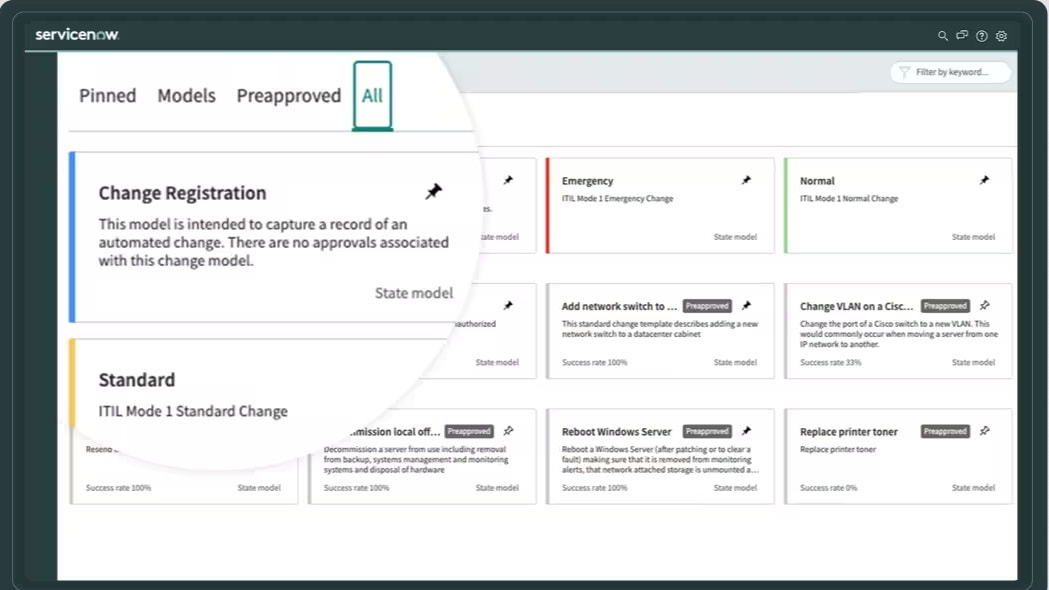Freshservice vs ServiceNow: Which ITSM tool suits your business best?
- 01Freshservice vs ServiceNow: overview
- 02What's the difference between Freshservice and ServiceNow?
- 03Freshservice pros and cons
- 04ServiceNow pros and cons
- 05Freshservice compared to ServiceNow
- 06ServiceNow compared to Freshservice
- 07Features comparison
- 08Freshservice vs ServiceNow: Which is the best for your business?
- 09Promotions on IT Management software
- 10Alternatives to Freshservice & ServiceNow
Save up to $100,000 on Freshservice
Save up to $100,000 on Freshservice
When it comes to IT Service Management (ITSM), having the right platform to manage and respond to IT issues and requests is essential for ensuring smooth operations. With the rise in technological advancements, the importance of a robust ITSM solution has become undeniable for businesses of all sizes. These platforms facilitate seamless issue tracking, asset management, and provide a framework for IT service delivery and support.
Given the plethora of options in the market, zeroing in on the ideal solution can be a daunting task. In this article, we dive deep into the comparison of two industry-leading solutions—Freshservice and ServiceNow. Through an in-depth examination of their features, pricing models, and unique selling points, we aim to guide you in choosing the one that aligns best with your business needs.
Freshservice vs ServiceNow: overview
Freshservice and ServiceNow stand as two paramount players in the realm of IT Service Management (ITSM) solutions, each boasting its distinct set of functionalities tailored to cater to a range of business needs.
Freshservice is renowned for its user-friendly interface and streamlined approach to IT support and service management, making it a preferred choice for businesses looking for an intuitive solution without a steep learning curve. It seamlessly integrates with various other platforms, ensuring that IT teams can manage requests, incidents, and assets efficiently. On the other hand, ServiceNow, with its extensive and scalable capabilities, offers a comprehensive platform for not just ITSM but also IT operations management (ITOM) and IT business management (ITBM). Its robust features allow enterprises to handle complex workflows, integrate with a multitude of tools, and customize extensively based on their unique requirements.
Let's dive deeper into the Freshservice vs. ServiceNow comparison to guide you in making a well-informed decision on the most suitable ITSM platform tailored to your specific operational and technological demands.
What's the difference between Freshservice and ServiceNow?


Freshservice offers a more affordable and user-friendly ticket management system that is particularly suitable for small to medium-sized organizations. It provides basic ticket management capabilities that allow IT teams to efficiently handle and resolve customer requests and incidents. In terms of reprts, the platform focuses on simplicity making it easy to access the needed data, with predefined reports and dashboards. Moreover, the powerful API that Freshservice offers, enables creation of customized integrations despite the fact it offers integration options with popular aplications like Slack, Teams, Google Calendar, etc. Such integrations are offered through a separate tab within the platform. Finally, the pricing model offered is pretty straightforwad and includes core ITSM capabilities. You have the option of trialing the platform for free, before you decide to commit to longer term.
ServiceNow, on the other hand, offers a comprehensive system for managing tickets that automates tasks and processes, resulting in improved efficiency and service quality. It can be customized to meet the specific needs of an organization and seamlessly integrates with other ServiceNow products, providing a complete IT solution. Similar to Freshservice, ServiceNow offers advanced reporting capabilities through pre-defined reporting templates. What sets ServiceNow apart are its key performance indicator reports and monitoring of service level agreements in real-time. In terms of integration, the platform offers integration for numerous external applications like Jira, Salesforce, MS Dynamics, etc. All of the integrations are done through the dashboard, which is where they’re displayed. Finally, the pricing is a bit more complex and is based on the number of service management applications and the number of users that actively access the applications.
In short, both platforms have much to offer in terms of ITSM, service desk, and managing an IT project. Feature-wise, Freshservice has more options on offer, but ServiceNow is not far behind, excelling at the ITSM features it has on offer. The final choice will come down to the specific needs you’re looking for and the price, as the pricing philosophies vary a great deal.
Freshservice pros and cons
What are the advantages of Freshservice?
- User-friendly interface: Freshservice offers an intuitive dashboard and user interface, making it accessible for users of all technical levels.
- Affordability: Generally, it is more budget-friendly, especially for small to medium-sized businesses.
- Built-in asset management: Allows teams to track and manage IT assets easily without needing additional tools.
- Easy integration: Freshservice easily integrates with a range of other software and platforms, enhancing its functionality.
- Gamification features: It incorporates gamification, which can motivate service desk agents and improve productivity.
What are the disadvantages of Freshservice?
- Limited advanced features: For large enterprises with complex needs, Freshservice might lack some advanced functionalities.
- Customization constraints: There are some limits on how much the platform can be customized compared to bigger competitors.
- Performance issues: Some users have reported occasional slowdowns or performance issues.
- Reporting limitations: While Freshservice offers reporting capabilities, they might not be as in-depth or flexible as some businesses require.
- Lesser third-party integrations: Although it integrates well, there are fewer third-party integrations available compared to major players in the market.
Compare Freshservice to other tools
ServiceNow pros and cons
What are the advantages of ServiceNow?
- Scalability: ServiceNow is designed for large enterprises, making it scalable for handling complex IT operations and workflows.
- Comprehensive platform: Beyond ITSM, ServiceNow offers solutions in IT operations management (ITOM), IT business management (ITBM), and more.
- Customization: ServiceNow provides extensive customization options to tailor the platform to specific business requirements.
- Advanced integrations: The platform integrates with a vast number of third-party tools and software, enhancing its capabilities.
- Robust reporting and analytics: ServiceNow offers powerful reporting tools and analytics functionalities for deeper insights into IT operations.
What are the disadvantages of ServiceNow?
- Learning curve: Due to its extensive features and capabilities, there is a steeper learning curve, especially for new users.
- Cost: ServiceNow can be on the pricier side, particularly for small businesses or organizations with limited budgets.
- Complex implementation: The implementation process can be lengthy and requires careful planning and potentially more resources.
- User interface: Some users find its interface less intuitive compared to more streamlined ITSM tools in the market.
- Occasional overhead: Given its vast functionalities, businesses might end up with features they don't need, adding unnecessary complexity.
Compare ServiceNow to other tools
Freshservice compared to ServiceNow
Freshservice and ServiceNow are both formidable contenders in the IT Service Management (ITSM) arena, but they cater to different audiences. Freshservice, with its user-friendly interface, is tailored primarily for small to medium-sized businesses seeking straightforward ITSM solutions. Its intuitive dashboard and cost-effectiveness make it a preferred choice for businesses that need core functionalities without extensive customizations.
In contrast, ServiceNow, designed for scalability and comprehensive service management, is more suitable for larger enterprises with complex IT requirements. Its robustness allows for extensive customizations and integrations, making it a powerhouse for organizations that demand a multifaceted ITSM approach.
Is Freshservice better than ServiceNow?
Whether Freshservice is better than ServiceNow truly depends on the specific needs and scale of an organization. Freshservice, known for its intuitive interface and cost-efficiency, is ideal for small to medium-sized businesses that require streamlined ITSM functionalities without the intricacies of extensive customizations. Its simplicity is its strength, making IT operations more accessible.
On the other hand, ServiceNow, with its comprehensive features and scalability, is tailored for larger enterprises with multifaceted IT requirements. It offers deep customizations and broad integrations. Thus, "better" is subjective; while Freshservice might be more suitable for some, ServiceNow might be the go-to for others.
What is Freshservice best used for?
Freshservice is best utilized for organizations seeking an efficient IT Service Management (ITSM) solution without the complexities of larger platforms. Its intuitive dashboard makes it ideal for businesses that prioritize user-friendliness and quick onboarding. With built-in asset management, Freshservice excels at tracking and overseeing IT assets, reducing overheads. The platform's gamification features motivate service desk agents, enhancing productivity.
Moreover, its cost-effective model suits small to medium-sized businesses aiming for core ITSM functionalities. In essence, Freshservice is optimal for entities desiring a straightforward, budget-friendly ITSM tool that seamlessly blends usability with essential service management features.
Can Freshservice replace ServiceNow?
Whether Freshservice can replace ServiceNow depends on the organization's specific needs and scale. For small to medium-sized businesses requiring a straightforward ITSM platform with an emphasis on user-friendliness and affordability, Freshservice can indeed be an effective alternative. Its streamlined interface and core functionalities cater well to entities that don't necessitate intricate customizations.
However, for larger enterprises with multifaceted IT requirements, ServiceNow's comprehensive suite, scalability, and extensive customization options make it a powerhouse in the ITSM domain. In essence, while Freshservice can be a viable replacement in certain scenarios, it might not encompass the full spectrum of capabilities offered by ServiceNow for more complex enterprises.
Is Freshservice cheaper than ServiceNow?
Freshservice’s pricing is generally perceived as more budget-friendly than ServiceNow, especially for small to medium-sized businesses. With its tiered pricing model that caters to basic ITSM needs, Freshservice provides an affordable entry point for organizations just starting their IT service management journey.
ServiceNow, tailored more towards larger enterprises with extensive IT requirements, tends to have a higher cost of entry due to its comprehensive suite of features and scalability. While both platforms offer varying pricing structures based on the functionalities and scale of operations, in a direct comparison for base offerings, Freshservice often emerges as the more cost-effective option.
Is there a better IT Management software than Freshservice?
When it comes to IT Service Management (ITSM) platforms, it's essential to evaluate whether there might be an alternative that better suits your organization's specific requirements.
Some notable alternatives to Freshservice in the ITSM domain include ServiceNow, Jira Service Management, BMC Remedy, Zendesk, and ManageEngine ServiceDesk Plus.
The choice of an ITSM platform hinges on your organization's unique IT management objectives, desired feature depth, integration capabilities, and budget considerations. While Freshservice is lauded for its user-friendly interface and cost-efficiency, other tools might offer more advanced customization options, broader IT operational functionalities, or specialized features that align more closely with your IT management and service strategy.
90% off the Pro plan for 1 year on Freshservice
Get 90% off the Pro plan for 1 year on Freshservice and up to $100,000 savings with Secret.
ServiceNow compared to Freshservice
ServiceNow and Freshservice, while both established in the ITSM landscape, target distinct segments of the market. ServiceNow, with its robust and scalable features, is engineered for large enterprises that demand extensive customizations, integrations, and a comprehensive IT service management approach. It's not just an ITSM tool but a platform that covers IT operations management (ITOM) and IT business management (ITBM).
In contrast, Freshservice shines with its simplicity and user-friendly interface, making it a favored choice for small to medium-sized businesses. Its intuitive design emphasizes streamlined IT operations without the steep learning curve, offering a more straightforward, albeit less feature-rich, experience compared to ServiceNow.
Is ServiceNow better than Freshservice?
Whether ServiceNow is "better" than Freshservice hinges on the context and specific needs of an organization. ServiceNow, with its extensive suite of features and adaptability, caters to large enterprises that require a comprehensive and scalable ITSM platform, often accommodating complex workflows and broader IT needs, from operations to business management.
In contrast, Freshservice, with its more streamlined and user-friendly interface, targets small to medium-sized businesses, focusing on simplicity and core ITSM functionalities. Thus, while ServiceNow offers depth and versatility suitable for expansive enterprises, Freshservice provides ease and efficiency, making the notion of "better" a matter of organizational preference and requirements.
What is ServiceNow best used for?
ServiceNow is best used for comprehensive IT Service Management (ITSM) in large enterprises with intricate IT needs. Its robust platform extends beyond basic ITSM to encompass IT operations management (ITOM), IT business management (ITBM), and even custom application development. Its scalability allows it to manage complex workflows, integrate a vast array of third-party tools, and accommodate extensive customizations.
ServiceNow is also lauded for its powerful reporting and analytics capabilities, providing deep insights into IT operations. Given its breadth and depth of functionalities, ServiceNow is optimal for organizations that demand a holistic, interconnected approach to their IT service and operations management.
Can ServiceNow replace Freshservice?
ServiceNow, given its comprehensive suite of features and capabilities, can replace Freshservice for organizations seeking a more extensive ITSM platform. While Freshservice is tailored for streamlined operations and simplicity, ServiceNow offers depth, scalability, and a vast array of functionalities beyond basic ITSM, including ITOM and ITBM.
For large enterprises with multifaceted IT needs or those seeking advanced customizations and integrations, ServiceNow emerges as a potent alternative. However, the switch might involve a steeper learning curve and higher costs. In essence, while ServiceNow can replace Freshservice, the decision should hinge on the organization's size, growth projections, and specific IT requirements.
Is ServiceNow cheaper than Freshservice?
In general, ServiceNow is not considered cheaper than Freshservice. ServiceNow's comprehensive feature set, designed primarily for larger enterprises with complex IT needs, tends to come with a higher price tag. Its extensive functionalities, spanning from ITSM to ITOM and ITBM, align with its premium pricing.
Conversely, Freshservice, with its focus on streamlined IT service management, offers tiered pricing models that are typically more budget-friendly, especially for small to medium-sized businesses. While both platforms have varying costs based on functionalities and scale, when comparing base offerings, Freshservice often stands out as the more cost-effective choice over ServiceNow.
Is there a better IT Management software than ServiceNow?
When exploring alternatives to ServiceNow, it's essential to determine if there's a software that better matches your specific IT management needs.
Some prominent competitors to ServiceNow in the IT Service Management (ITSM) domain include Freshservice, Jira Service Management, BMC Remedy, Zendesk, and ManageEngine ServiceDesk Plus.
The choice of an ITSM software largely rests on your organization's unique IT challenges, operational scale, desired customizability, and budget constraints. While ServiceNow is renowned for its expansive features and scalability, other platforms may shine in areas like user-friendliness, seamless integrations, or specific industry solutions. Thoroughly assessing each software based on your primary objectives will guide you in selecting the ideal platform for your IT management tasks.
Features comparison
ServiceNow Triumphs Over Freshservice in Advanced Integration Capabilities

When it comes to integration capabilities, ServiceNow comes out on top. Boasting a powerful API, ServiceNow extends a broad spectrum of in-house and third-party integration options. Take, for instance, its ability to synchronize with enterprise platforms like SAP, Oracle, or Microsoft Dynamics seamlessly. This vast integration expanse makes it a preferred choice for multinational corporations having multifaceted software landscapes.
On the contrary, Freshservice, while commendable in its integration offerings, doesn't match the breadth of ServiceNow. It might cater to common tools like Slack or Trello but could struggle with niche enterprise solutions. For organizations prioritizing intricate software meshing, ServiceNow undoubtedly holds the upper hand.
ServiceNow Lead Scoring Advantage Over Freshservice

ServiceNow emerges as the frontrunner in IT service disruption handling and resolution. Its dedicated incident management feature sets it apart, guaranteeing minimal downtime and the seamless continuation of operations. For instance, when a critical server goes offline, ServiceNow's incident management swiftly triggers alerts, assigns tasks, and provides real-time status updates, ensuring a rapid response to restore service.
On the other hand, Freshservice, while offering robust service desk IT and SLA management tools, does not emphasize incident management as a core feature. Although it excels in other areas, such as ticket management and service level agreement compliance, it may not be as well-suited for organizations with a heavy reliance on incident management for business continuity. This comparison underscores the importance of evaluating your specific IT needs when choosing between these two platforms.
Freshservice Outshines ServiceNow in User-Friendly Interface

When it comes to IT Service Management tools, ease of use is crucial for rapid deployment and user adoption. When contrasting Freshservice and ServiceNow, Freshservice undoubtedly stands out in this aspect. Its interface, designed with simplicity in mind, is not just intuitive but also visually pleasing, ensuring even those with limited tech experience can navigate with ease. For example, ticketing and asset management in Freshservice are straightforward and require minimal setup.
ServiceNow, in contrast, is power-packed with features but comes with a more complex interface. This often necessitates dedicated training sessions or workshops, especially for intricate modules like ITOM or ITBM. While large corporations might lean towards ServiceNow for its depth, startups or mid-sized businesses prioritizing rapid implementation will likely find Freshservice to be the more accessible option.
Freshservice Leads in ITIL-Aligned Simplicity Over ServiceNow's Technical Mastery

Freshservice scores points for its immediately accessible ITIL-aligned service management software. For organizations, especially those new to ITIL practices, this means a near-seamless transition. Imagine deploying a tool like Freshservice in a medium-scale enterprise and having the teams navigate it effortlessly without any hiccups.
ServiceNow, while undeniably powerful, demands a deeper dive. Setting up processes or tailoring them to specific business needs in ServiceNow often requires a technical acumen, possibly involving IT professionals or even dedicated training sessions. For those seeking a straightforward ITIL experience, Freshservice shines bright.
ServiceNow Outpaces Freshservice in Comprehensive Change Management

When exploring the landscape of change management capabilities, both ServiceNow and Freshservice bring forward commendable features. Yet, ServiceNow distinctly emerges as the leader in orchestrating the intricate dance of planning, scheduling, and actualizing changes. For instance, ServiceNow employs AI to predict the potential impact of a change, ensuring transitions are smooth and that business continuity remains unhampered.
Meanwhile, Freshservice shines with its IT Asset Management feature, allowing for a clear snapshot of assets which can be crucial during change implementations. However, when it comes to the granularities and depth of change orchestration, especially in large-scale, complex scenarios, ServiceNow's offering stands unmatched in its breadth and precision.
Freshservice’s Gamification Gives a Competitive Edge Over ServiceNow

Freshservice distinguishes itself with a unique approach—gamification in the workplace. Freshservice's gamification features are tailored to boost team motivation and productivity through a system of rewards and healthy competition among colleagues. For example, it allows IT teams to earn points or badges for resolving tickets promptly, fostering a sense of accomplishment and friendly rivalry.
In contrast, ServiceNow does not emphasize gamification as a central feature of its platform. This sets Freshservice apart by providing a fun and engaging way to incentivize and recognize outstanding performance within IT teams. For organizations seeking to infuse their work environment with a dose of competition and motivation, Freshservice's gamification features make it a standout choice in the world of IT service management.
Both Freshservice and ServiceNow Provide Robust Self-Service Features

When it comes to self-service capabilities, both Freshservice and ServiceNow offer robust solutions. Freshservice boasts a user-friendly self-service portal that empowers customers to tackle their problems independently. This portal streamlines issue resolution, slashing support ticket volumes. For example, customers can access step-by-step troubleshooting guides and FAQs, reducing their reliance on support agents.
On the other hand, ServiceNow excels with its extensive self-service knowledge base. Users can tap into a wealth of resources, from FAQs to informative articles. For instance, employees can access how-to guides on software installations, fostering self-sufficiency and lightening the load on support teams. In this self-service showdown, both tools offer potent self-help capabilities, making it a tough choice for businesses seeking to enhance user empowerment.
Subscribe to our newsletters.
No FOMO here. Stay up-to-date on all the latest deals and news with our monthly newsletter straight to your inbox like 122,000+ entrepreneurs (+ Get 10% off on on our Premium Membership!)
Freshservice vs ServiceNow: Which is the best for your business?
Freshservice is the best tool for you if:
- You aim to revolutionize your IT support with its intuitive interface and robust automation capabilities.
- You prioritize cost-effective IT service management solutions without compromising quality or scalability.
- Enhancing employee productivity and customer satisfaction through efficient service delivery is your goal.
- You require a cloud-based, mobile-responsive platform for seamless ITSM operations, accessible from anywhere.
- Staying ahead in the competitive IT landscape means harnessing advanced analytics and insights.
ServiceNow is the best tool for you if:
- You need comprehensive IT and business service management with robust workflow automation.
- You seek a scalable solution capable of adapting to your organization's evolving needs.
- You prioritize efficiency, ensuring streamlined service delivery and reduced operational costs.
- You value a unified platform for IT, customer, and employee service management.
- Data-driven decision-making and analytics are essential to your service optimization strategy.
Alternatives to Freshservice & ServiceNow
Promotions on IT Management software
Start saving on the best SaaS with Secret.
Secret has already helped tens of thousands of startups save millions on the best SaaS like Freshservice, ServiceNow & many more. Join Secret now to buy software the smart way.










